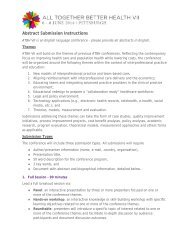Health and Social Care Policy and the Interprofessional ... - CAIPE
Health and Social Care Policy and the Interprofessional ... - CAIPE
Health and Social Care Policy and the Interprofessional ... - CAIPE
Create successful ePaper yourself
Turn your PDF publications into a flip-book with our unique Google optimized e-Paper software.
diagnosis <strong>and</strong> treatment process is often desirable <strong>and</strong> sometimes<br />
indispensable’ (p7).<br />
Divided into six ‘rights’ categories (confidentiality <strong>and</strong> privacy, consent,<br />
information, care & treatment, application) <strong>the</strong> WHO Declaration frequently<br />
implicitly <strong>and</strong> occasionally explicitly refers to a patient’s right to expect that <strong>the</strong><br />
health professions will collaborate, co-operate <strong>and</strong> integrate in planning,<br />
delivering <strong>and</strong> evaluating care.<br />
Within <strong>the</strong> EU <strong>the</strong>re are a number of health service configurations each of<br />
which have evolved in response to <strong>the</strong> individual Member State policy<br />
priorities. Each model has its advantages <strong>and</strong> is heralded by <strong>the</strong>ir owners as<br />
‘better or even best’, in specific contexts, than o<strong>the</strong>r Member States. There<br />
has been a much greater emphasis on improving health systems performance<br />
in practice <strong>and</strong> education <strong>and</strong> training on a pan European basis within <strong>the</strong><br />
past few years however <strong>and</strong> evidence of this can be found at:<br />
http://europa.eu.int/comm/health/ph_overview/health_forum/health_forum_en.<br />
htm<br />
Some Member States, as a result of European Court of Justice rulings, have<br />
had to overhaul <strong>the</strong>ir health service provision radically but now are ‘beginning<br />
to see <strong>the</strong> potential benefits from greater collaboration, in particular where<br />
<strong>the</strong>y face shortages of capacity or have identified concrete benefits for<br />
cooperating across frontiers’.<br />
The Lisbon European Council (2000) established <strong>the</strong> ‘Open Method of Coordination’<br />
which ‘facilitates exchange of best practice <strong>and</strong> achieving greater<br />
convergence in areas where harmonisation of legislation is not possible. It<br />
involves agreeing broad goals, establishing indicators <strong>and</strong> benchmarks of<br />
good practice, developing guidelines for policy, with targets to be achieved,<br />
that can be adopted where possible, <strong>and</strong> establishing a system of monitoring<br />
that is organised on <strong>the</strong> basis of mutual learning’.<br />
http://europa.eu.int/comm/health/ph_overview/health_forum/health_forum_en.<br />
htm<br />
Here <strong>the</strong>n is concrete evidence that <strong>the</strong>re is a wind of change sweeping<br />
across Europe. Patients in every country are being actively encouraged to<br />
take ownership of <strong>the</strong>ir health <strong>and</strong> self manage (or at <strong>the</strong> very least be an<br />
equal partner) <strong>the</strong>ir care when unwell. All individual member states face <strong>the</strong><br />
same problems <strong>and</strong> challenges in that <strong>the</strong>y have an ageing population, who<br />
have increasing care needs, <strong>and</strong> a diminishing workforce to deliver <strong>the</strong> care<br />
needed. A pan European model is emerging that focuses on patient <strong>and</strong> staff<br />
mobility <strong>and</strong> transferability, with an emphasis on international collaboration,<br />
co-operation <strong>and</strong> integration when planning, delivering <strong>and</strong> evaluating care.<br />
EU policy<br />
It is fascinating to note that one of <strong>the</strong> most comprehensive websites found on<br />
EU policy relating to health <strong>and</strong> social care includes a large glossary which<br />
does not include ‘patient’, user’, ‘client’, ‘carer’, ‘teamwork’, 'collaboration',<br />
6













